Monday Feb 23, 2026
Monday Feb 23, 2026
Thursday, 7 November 2019 00:00 - - {{hitsCtrl.values.hits}}

US President Donald Trump meets with China’s President Xi Jinping at the start of their bilateral meeting at the G20 leaders summit in Osaka, Japan, 29 June – Reuters
WASHINGTON (Reuters): The US and China are working to narrow their differences enough to sign a ‘phase one’ trade deal as early as this month, but suggestions for a signing venue range from Alaska to Greece.
US President Donald Trump said he and Chinese President Xi Jinping could sign the agreement in Iowa, a State with historical connections to Xi, and one that would benefit from increased Chinese purchases of US farm goods.
On the other hand, one Chinese official said Beijing was floating the possibility of a meeting in Greece, where Xi is due to arrive on Sunday, after which he will head to Brazil for a summit of major emerging market countries which starts 13 November.
Multiple sources briefed on the trade talks in the US said a signing in Greece was unlikely. Greek government officials said that so far, there had been no indication of a request for such a ceremony during Xi’s visit.
Instead, the two sides could choose a relative halfway point such as Hawaii or Alaska, multiple US sources said.
“There was a suggestion about Alaska, there was a suggestion about Hawaii. I’m sure the Chinese will have some suggestions in China,” US Commerce Secretary Wilbur Ross told Bloomberg TV on 4 November, adding “that should be the easiest part of the whole thing to negotiate”.
The lack of consensus on a signing location reflects the fluid nature of the talks. Final details have yet to be nailed down, including an enforcement mechanism and the extent of tariff relief for China.
It also reflects how politically charged any venue may be. After 16 months of public posturing and tit-for-tat tariffs, neither leader wants to appear weak at home nor to foreign rivals, trade experts said.
Iowa would be the Trump administration’s first choice, given the political appeal to a major Trump farm-state constituency for a deal expected to increase US exports of soybeans, pork and other products that have been hurt by the 16-month trade war.
One source familiar with China’s thinking said Beijing was asking for tariff reductions in order to sell the agreement domestically. “China needs political cover to come to the US without a State visit. It can’t be seen as a capitulation,” said the source.
Thus far, Trump has only cancelled a scheduled 15 October tariff increase on $ 250 billion goods. Trump administration officials have said they are still considering the fate of a round of tariffs scheduled for 15 December on Chinese-made cell phones, laptop computers, toys and clothing.
China is seeking the removal of US tariffs imposed on 1 September on Chinese goods, as well as some relief from earlier tariffs, people familiar with the negotiations said on Monday.
Xi has a long connection to Iowa, where he went in 1985 as a regional Communist Party official for agricultural meetings, striking up a friendship with Terry Branstad, then Iowa’s governor and now US Ambassador to China.
Trump has invited Xi to the US, subject to a ‘phase one’ deal, White House National Security adviser Robert O’Brien told reporters in Bangkok on Sunday. “We’ll have to see if that comes to pass or not.”